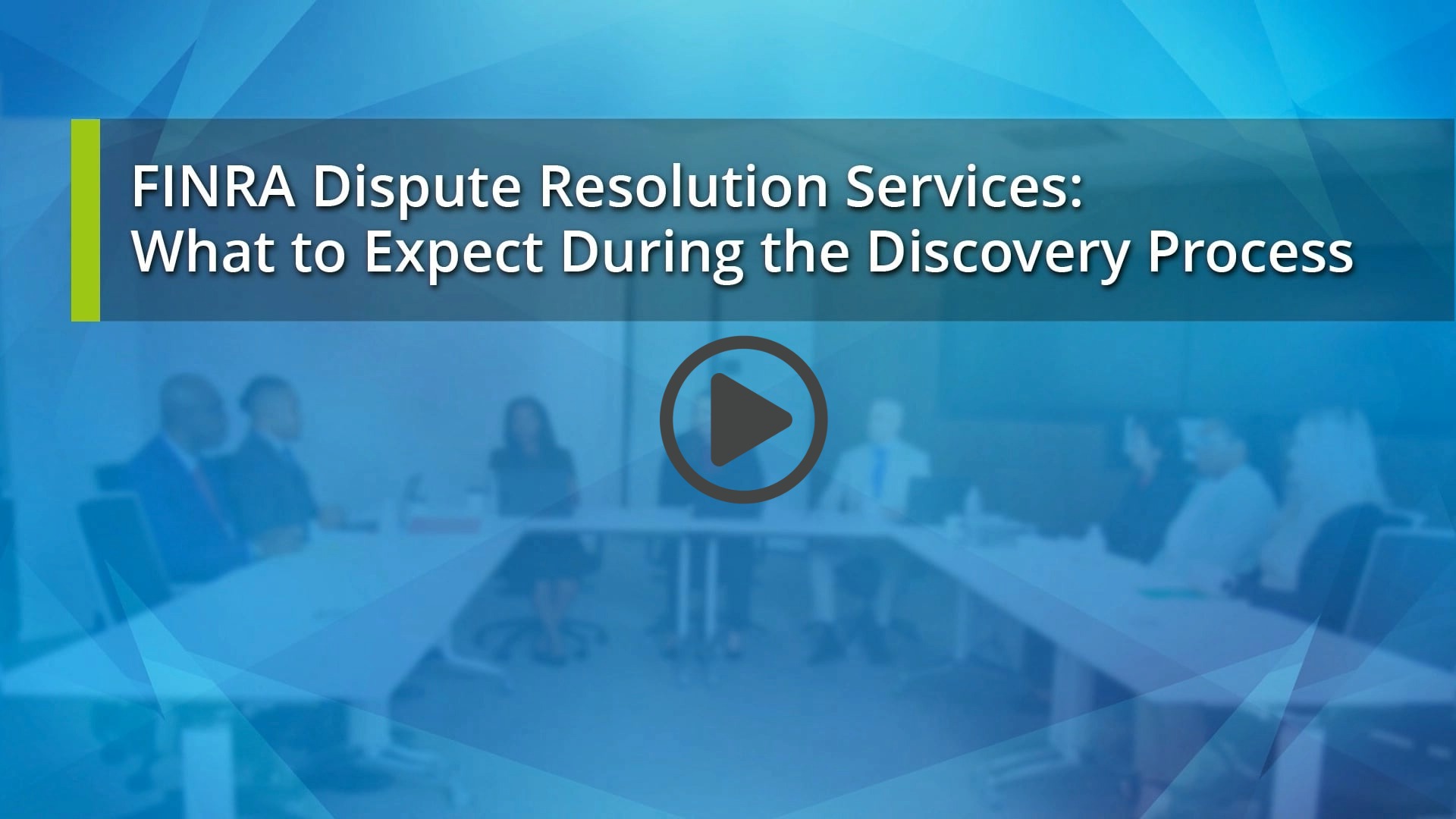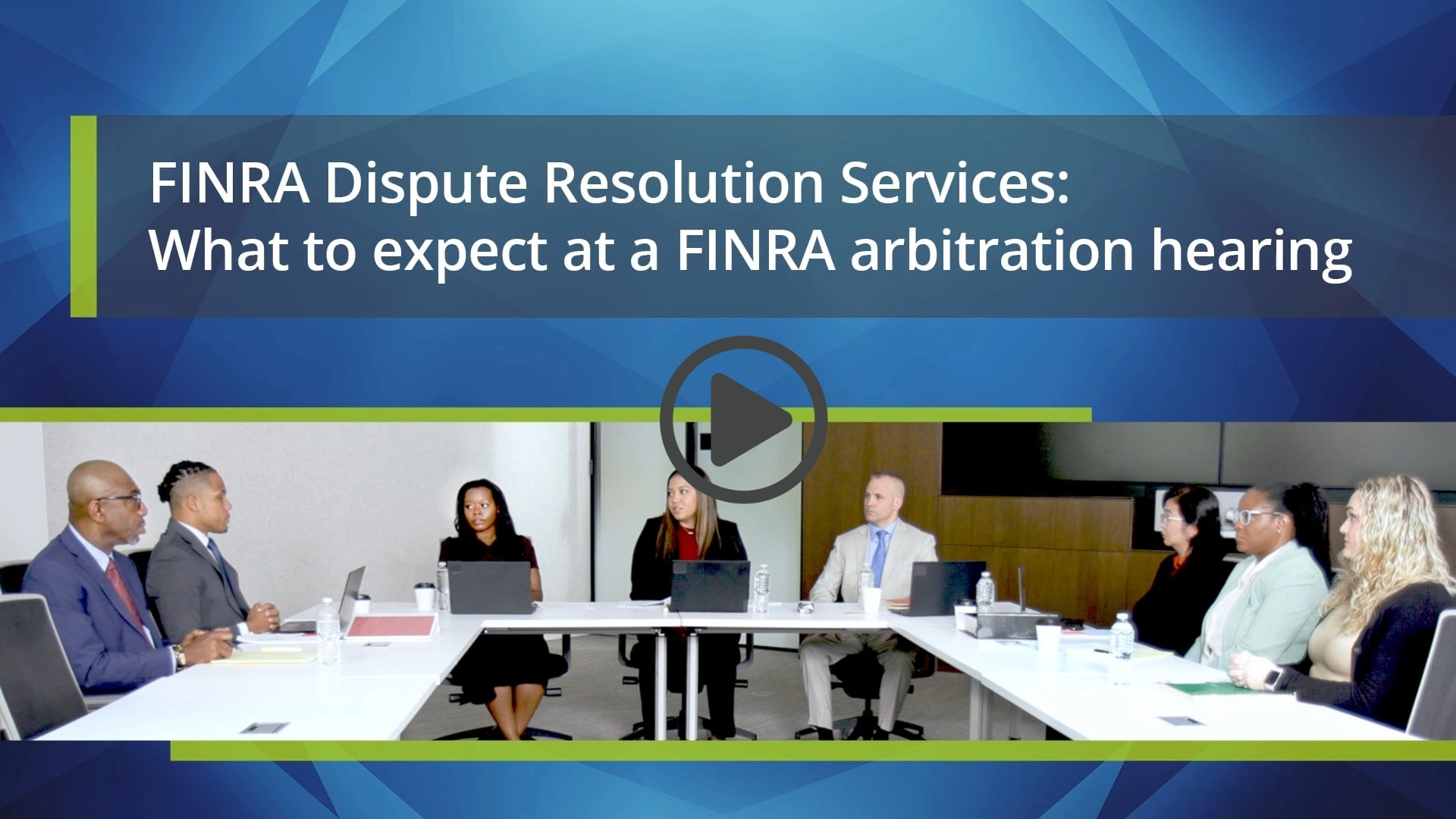Resources for Individuals Representing Themselves
You should consider hiring an attorney to represent you during FINRA arbitration or mediation proceedings. FINRA does not require individuals to hire attorneys. However, you might consider hiring an attorney to provide direction and advice. If there is a hearing, all parties will have to question witnesses and present their cases. For cases that arbitrators decide on the papers without a hearing, you will be required to prepare written submissions for the arbitrator.
Will the other party have an attorney?
Probably, yes. Even if you do not hire an attorney, brokerage firms will likely be represented by an attorney.
What if I cannot afford an attorney?
If you cannot afford an attorney, some law schools provide legal representation through securities arbitration clinics.
Where can I find an attorney?
FINRA Dispute Resolution Services staff members cannot recommend a specific lawyer. However, we do offer several resources to help you find an attorney.
If you do represent yourself, you will need to be familiar with the following:
What are arbitration and mediation?
Arbitration is a formal and binding alternative to litigation in which parties select a neutral third party, called an arbitrator, to resolve a dispute.
Mediation is an informal process in which the parties agree to voluntarily work with a trained, impartial mediator who facilitates negotiations between disputing parties, helping them find a mutually acceptable solution.
Learn about arbitration & mediation
How do I file an arbitration or mediation claim?
Investors may file a request to arbitrate or mediate with FINRA when they have a dispute involving the business activities of a brokerage firm or one of its brokers.
Tip: Before submitting your filing, make sure that your documents do not contain personal confidential information. Please review the Protecting Personal Confidential Information webpage for more information.
Alternatively, you can file a complaint with FINRA's Investor Complaint Center in order to alert FINRA to potentially fraudulent or suspicious activities by brokerage firms or brokers. Filing an investor complaint does not preclude you from filing a separate arbitration or mediation case with FINRA Dispute Resolution Services.
Will I have to pay any fees?
The main arbitration fees are filing fees and hearing fees. Additional fees are charged for other procedural processes that are needed in a specific case (e.g., discovery motion fees or adjournment fees) as well as fees assessed only against member firms. FINRA mediation is voluntary, but it tends to be more cost effective than arbitration. The main mediation fees comprise filing fees and the mediator’s session fee.
What if I cannot afford the fees?
If you are experiencing financial difficulties, you can request a waiver of some of the fees. FINRA will require you to send documents to support your request, such as tax returns, pay stubs or other evidence of financial hardship.
What happens after I file my arbitration case?
After you file your claim, we will assign a case administrator to the case, and determine the place of the hearing based on where you lived at the time of the dispute. FINRA provides each respondent (a respondent is a firm or person against whom you've filed your case) with your statement of claim. A respondent will have time to answer the statement of claim.
Learn about the arbitration process
Tip: FINRA staff are neutral; they cannot give legal advice to the parties. However, FINRA staff can answer administrative questions.
Who will decide my case?
Your case will be decided by a panel of one or three arbitrators, depending on the amount in dispute. The arbitrators are selected by the parties.
Learn more about arbitrator selection
Tip: Simplified arbitration cases, which involve disputes of $50,000 or less, are decided by a single arbitrator. Unless a customer requests a hearing, simplified arbitration cases will be decided on the pleadings and other materials submitted by the parties without a hearing. As with non-simplified arbitration cases, parties in simplified arbitration cases may seek discovery, ask the arbitrator to defer ruling until discovery has been taken, and can file final evidentiary briefs.
What happens during the Initial Prehearing Conference?
Once the parties select arbitrators, the arbitrators hold an initial prehearing conference with the parties – typically via video conference. During the conference, the arbitrators and parties discuss procedural issues, the mediation alternative, discovery, and scheduling the hearing.
What is discovery?
Discovery takes place before the hearing and involves the exchange of documents and information and the identification of witnesses. The Code of Arbitration Procedure requires parties to cooperate to the fullest extent possible in the voluntary exchange of documents and information. Information requests may include questions about your investment history, assets, and income. Disputes related to discovery are addressed through motions and will usually be decided by the chairperson of the arbitration panel.
FINRA's Discovery Guide contains guidelines to help parties and arbitrators during discovery.
What happens at the evidentiary hearing?
The evidentiary hearing follows discovery. At the hearing, each party presents its case to the arbitrators. The parties will question witnesses and present documents to the arbitrators. The claimant makes an opening statement, followed by the respondent's opening statement. Each side presents and questions their witnesses. Both parties can cross-examine any witness, which means that you have the opportunity to ask questions of the other party’s witnesses. Parties can object to evidence and the arbitrators decide whether to admit the evidence. When the parties finish questioning witnesses and presenting evidence, they make closing arguments. Closing arguments provide parties an opportunity to summarize what they believe they have proven.
Tip: Parties are not allowed to speak with the arbitrators outside of the hearing, either before the hearing, or after they decide your case. Any off-the-record conversations between a party and an arbitrator, no matter how innocent, could negatively affect the case.
What if due to a disability I need an accommodation for the hearing?
FINRA is dedicated to ensuring that individuals with disabilities have equal and full access to FINRA’s dispute resolution forum. If a neutral or case participant needs an accommodation to participate in an arbitration hearing or a mediation session (e.g., closed captioning may be available for participants with hearing impairments) they should contact FINRA to make arrangements prior to the scheduled hearing or mediation session.
What if I need interpretation services at the hearing?
If a party wishes to have interpretation services at the hearing, generally, the requesting party will be responsible for arranging the service and any related costs. A party experiencing financial difficulties can submit a request for a waiver of interpretation services fees to their arbitration case administrator no later than 60 days before the first day of the evidentiary hearing. If the waiver is granted, FINRA will be responsible for arranging interpretation services and the cost of the interpreter.
What if I need to reschedule the hearing?
FINRA charges a postponement fee for all postponed hearings equal to the applicable hearing session fee. The arbitrators may allocate the fee to the party or among the parties that agreed to or requested the postponement. FINRA will not charge this fee if the parties advise FINRA that they have reached a final settlement and the case can be closed.
Separate from the above postponement fee, if a party requests and the arbitrators grant a postponement within ten days before a scheduled hearing session, the party making the request shall pay an additional fee to each arbitrator. This fee also applies if a hearing is cancelled because the parties have settled the case.
Learn more about late cancellation fees
What happens after the hearing?
An award will be issued, stating how the arbitrator(s) decided the case. Arbitrators are not required to provide a written explanation for their decision. In addition to deciding your claim, the arbitrators will decide who is to pay the fees and costs.
Depending on the number of hearing sessions, and whether arbitrators issue orders before the hearing, you may receive a bill for fees at the end of the case (regardless of how the arbitrators decide the case or if the parties settle the case).
When the arbitrators decide the case, they will also decide which party pays the fees. All parties must abide by the award, unless a party successfully challenges the award in court.



